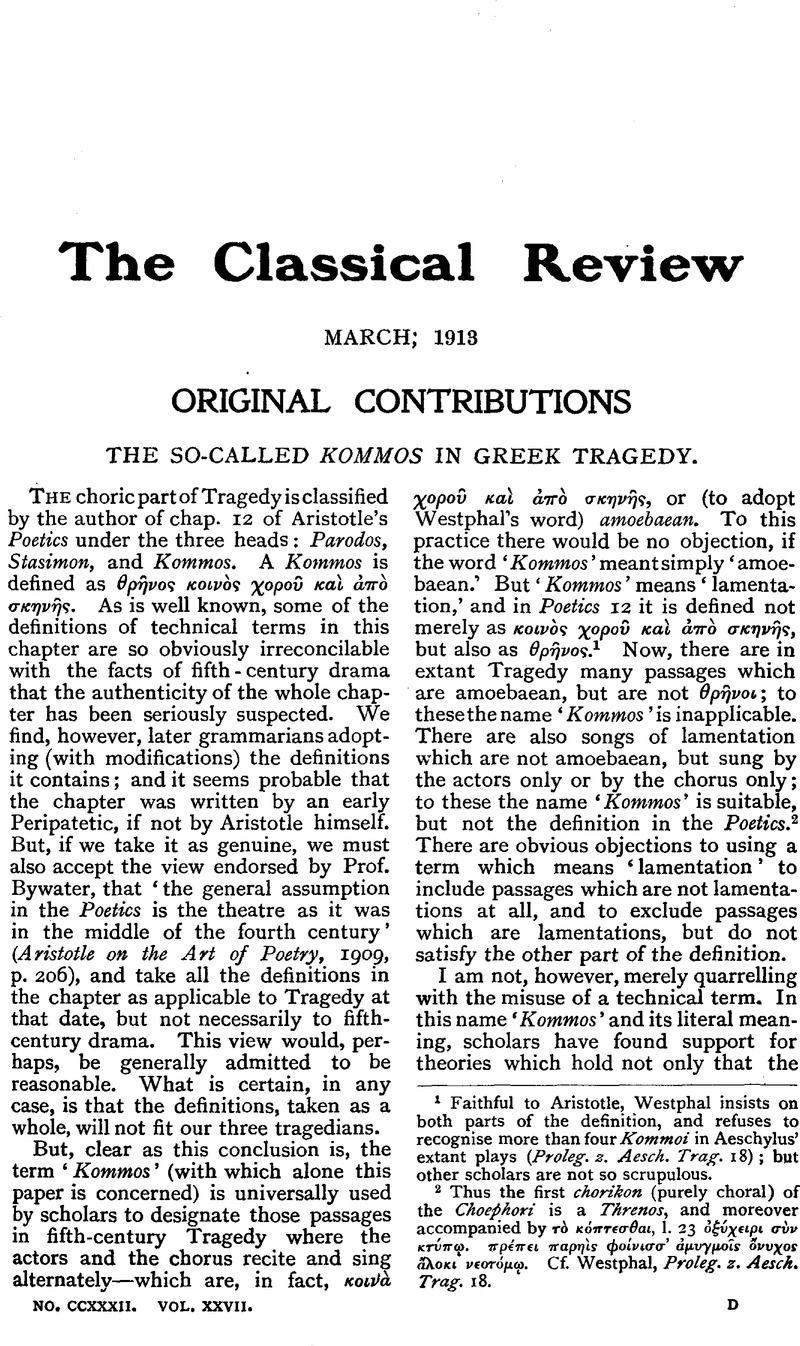Article contents
The So-called Kommos in Greek Tragedy
Published online by Cambridge University Press: 27 October 2009
Abstract

- Type
- Original Contributions
- Information
- Copyright
- Copyright © The Classical Association 1913
References
page 41 note 1 Faithful to Aristotle, Westphal insists on both parts of the definition, and refuses to recognise more than four Kommoi in Aeschylus' extant plays (Proleg. z. Aesch. Trag. 18); but other scholars are not so scrupulous.
page 41 note 2 Thus the first chorikon (purely choral) of the Choephoxi is a Threnos, and moreover accompanied by τ⋯ κ⋯πτεσθαι 1. 23 ![]() . Cf. Westphal, , Proleg. z. Aesch. Trag. 18.Google Scholar
. Cf. Westphal, , Proleg. z. Aesch. Trag. 18.Google Scholar
page 42 note 1 The phrase ἔκοΦα κομμ⋯ν Ἄριον in Aesch. Choeph. 422 is, of course, no evidence for a technical use of the term.
page 42 note 2 Théorie des formes lyriques de la Tragédie grecque. Paris, 1893, p. 17.Google Scholar
page 42 note 3 ‘L'étymologie du mot est donnée par Eschyle, Choéphores, 423: ἔκοΦα κομμ⋯ν.’
page 42 note 4 E.g., Christ-Schmid, , Griech. Literaturgesch. (1908) i. 263Google Scholar: ‘Der Tragödie besonders eigen waren die Klagegesänge, κομμο⋯ genannt von der bei Totenklagen üblichen Sitte, sich die Brust zu zerschlagen.’ Weil, H., Études sur le drame antique, p. 5Google Scholar: ‘Tout porte à croire que la lamentation était un élément constitutif de la tragédie primitive. On trouve partout dans Eschyle ce chant lugubre…. Plus tard, sans doute, l'antique lamentation ne revient pas dans toutes les pièces … mais le terme qui désignait ces lamentations, le nom de κομμ⋯ς, reste attaché à tous les dialogues lyriques entre le choeur et les acteurs, et témoigne du caractère originel de ces morceaux.’ Nilsson, , in his admirable paper, ‘Der Ursprung der Tragödie,’ N. Jahrb. xxvii. (1911) 625Google Scholar, after pointing out that there are lamentations in Homer over still living heroes, continues: ‘Die Tragödie hat also keine Neuerung eingeführt, als sie den Kommos in jeder grossen Gefahr und Angst anstimmen liess, auch wenn es sich nicht um einen Toten handelte.’
page 42 note 5 The Cyclops is, of course, omitted, and also the Alcestis, which is not a tragedy.
page 43 note 1 The final anapaests of the Prometheus, a play whose whole structure is unlike the other Aeschylean plays, ought not perhaps to be called a ‘Kommos,’ though the Chorus take part.
page 44 note 1 If we follow Proclus (p. 321a B.), these, cases will count as θρ⋯νοι for, in contrast with τ⋯ ⋯πικ⋯δειον = the lament over the body before burial, ἔ θρῆνος οὐ περιγράφεται χρ⋯νῳ. Eustath. on Od. 1673 limits θρ⋯νος to a lamentation at the burial or at the annual festival of commemoration ![]() and contrasts with it ⋯ ⋯νικ⋯δειος λ⋯γος the speech of encomium (ἔπαινος το⋯ τελευτ⋯σαντος) which belongs to later rhetoric.
and contrasts with it ⋯ ⋯νικ⋯δειος λ⋯γος the speech of encomium (ἔπαινος το⋯ τελευτ⋯σαντος) which belongs to later rhetoric.
page 44 note 2 Agam. 1321 Kassandra: ![]() .
.
page 44 note 3 Tzetzes, π. τραγ. ποινσ 64, distinguishes between κομμ⋯ς and θρ⋯νος:  He then quotes Aristotle's definition:
He then quotes Aristotle's definition: ![]() From Eukleides' list of the parts of Tragedy (ibid., 94 ff.) κομμ⋯ς disappears, and τ⋯ ⋯μοιβαῖον, ⋯ ⋯ξ ⋯μοιβ⋯ς ᾠδ⋯ takes its place. In another list (ibid., 142) κο⋯ρισμα is substituted:
From Eukleides' list of the parts of Tragedy (ibid., 94 ff.) κομμ⋯ς disappears, and τ⋯ ⋯μοιβαῖον, ⋯ ⋯ξ ⋯μοιβ⋯ς ᾠδ⋯ takes its place. In another list (ibid., 142) κο⋯ρισμα is substituted: ![]() . Others substituted the term κομματικ⋯ν (Pollux, IV. 53; Arg. Aesch. Pers.,) which presumably means ‘in bits’ (κ⋯μματα).
. Others substituted the term κομματικ⋯ν (Pollux, IV. 53; Arg. Aesch. Pers.,) which presumably means ‘in bits’ (κ⋯μματα).
page 45 note 1 Pind. Ol. IX. I ![]() . Christ (ad loc.), Victor vero ipse vice praecentoris (⋯ξ⋯ρχον) fungebatur sodalibus praeeuntis, id quod Pindarus verbo ⋯γεμονε⋯σαι significavit et scholiasta hac adnotatione confirmat:
. Christ (ad loc.), Victor vero ipse vice praecentoris (⋯ξ⋯ρχον) fungebatur sodalibus praeeuntis, id quod Pindarus verbo ⋯γεμονε⋯σαι significavit et scholiasta hac adnotatione confirmat: ![]() . See Harrison, J. E., Themis (1912), p. 256.Google Scholar
. See Harrison, J. E., Themis (1912), p. 256.Google Scholar
page 45 note 2 I cannot agree with Prof. Bywater's note on this passage (Aristotle on the Art of Poetry, 1909, p. 134), where he says that Aristotle means by ⋯ξ⋯ρχων the ‘poet-composer,’ and that ‘⋯ξ⋯ρχειν διθ⋯ραμβον is practically a synonym for διδ⋯σκειν διθ⋯ραμβον.’ The part of ⋯ξ⋯ρχωνmight be taken by the poet-composer, but the word, beyond all question, means ‘leader’; and Aristotle's point is that Tragedy arose from a certain lyrical form in which there was a distinct part performed by a ‘leader’ or leaders, not that it arose from a form which (like other forms of poetry) had a ‘poet-composer.’ For the ⋯ξ⋯ρχων cf. E. Reisch, Zur Vorgeschichte d. att. Tragödie in Festschr. f. Th. Gomperz, 1902, p. 451 ff.
- 1
- Cited by




